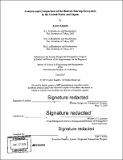| dc.contributor.advisor | Michael A. Cusumano. | en_US |
| dc.contributor.author | Kagami, Ayano. | en_US |
| dc.contributor.other | Massachusetts Institute of Technology. Engineering and Management Program. | en_US |
| dc.contributor.other | System Design and Management Program. | en_US |
| dc.coverage.spatial | n-us---a-ja--- | en_US |
| dc.date.accessioned | 2019-09-17T19:50:21Z | |
| dc.date.available | 2019-09-17T19:50:21Z | |
| dc.date.copyright | 2019 | en_US |
| dc.date.issued | 2019 | en_US |
| dc.identifier.uri | https://hdl.handle.net/1721.1/122248 | |
| dc.description | Thesis: S.M. in Engineering and Management, Massachusetts Institute of Technology, System Design and Management Program, 2019 | en_US |
| dc.description | Cataloged from PDF version of thesis. | en_US |
| dc.description | Includes bibliographical references (pages 173-178). | en_US |
| dc.description.abstract | Many regions and cities, including in Japan, are interested in developing a biotech startup ecosystem. Therefore, there are several strategies and policy instruments in Japan to promote medical research and development and collaboration among universities and industries, and to foster entrepreneurship in Japanese society. However, a startup ecosystem is a complicated system because there are many stakeholders and many ways of interactions among them. For this reason, it is assumed that the coordination of many factors, such as governments' policies and the academic and industrial environment, is required to develop the ecosystem. The Greater Boston area, where MIT is located, is a world-renowned biotech cluster. Many countries and cities have been trying to imitate this cluster, but just copying the ecosystem might not work in other cities because the environment surrounding the ecosystem is different from cluster to cluster. | en_US |
| dc.description.abstract | In this study, we analyze and compare the biotech startup ecosystems in the U.S. (Greater Boston and San Francisco Bay Area) and Japan (Tokyo (Kanto region) and Kyoto (Kinki region)) in order to understand the key factors required for developing the ecosystem and to get insights for developing an ecosystem in Japan. We also analyze universities locating within these areas from the standpoint of the interface machinery between academic research and industry. In the analysis, we compare the stakeholders and their network in each cluster and explore the advantages and challenges of Japanese clusters. For universities, we also compare the system of managing the intersection of academic researchers and industries in each university and explore the functions and features of offices involved in the system. | en_US |
| dc.description.abstract | The results of the analysis suggest that the Japanese biotech startup ecosystems have several challenges: the weakness of the network among stakeholders and of the support system for startups; the low level of entrepreneurship and of opportunities to foster it; and the limitation in the capital available. These challenges exist even though there is strong support from the governments and there are well-organized systems in universities for supporting not only collaboration with industry but also startups and student entrepreneurship. Therefore, taking advantage of the system in universities and utilizing them as the community and/or platform for stakeholders in the ecosystem, including the promotion of entrepreneurial education, might help Japanese clusters to develop successful biotech startup ecosystems. | en_US |
| dc.description.statementofresponsibility | by Ayano Kagami. | en_US |
| dc.format.extent | 178 pages | en_US |
| dc.language.iso | eng | en_US |
| dc.publisher | Massachusetts Institute of Technology | en_US |
| dc.rights | MIT theses are protected by copyright. They may be viewed, downloaded, or printed from this source but further reproduction or distribution in any format is prohibited without written permission. | en_US |
| dc.rights.uri | http://dspace.mit.edu/handle/1721.1/7582 | en_US |
| dc.subject | Engineering and Management Program. | en_US |
| dc.subject | System Design and Management Program. | en_US |
| dc.title | Analysis and comparison of the biotech startup ecosystem in the United States and Japan | en_US |
| dc.type | Thesis | en_US |
| dc.description.degree | S.M. in Engineering and Management | en_US |
| dc.contributor.department | Massachusetts Institute of Technology. Engineering and Management Program | en_US |
| dc.identifier.oclc | 1119537403 | en_US |
| dc.description.collection | S.M.inEngineeringandManagement Massachusetts Institute of Technology, System Design and Management Program | en_US |
| dspace.imported | 2019-09-17T19:50:19Z | en_US |
| mit.thesis.degree | Master | en_US |
| mit.thesis.department | SysDes | en_US |
